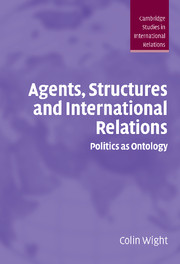Book contents
- Frontmatter
- Contents
- List of figures
- Acknowledgements
- Introduction
- 1 IR: a science without positivism?
- 2 The agent–structure problem: from social theory to IR theory
- 3 The agent–structure problem in IR theory: preliminary issues
- 4 Structure
- 5 Agency
- 6 The agent–structure problem: epistemology
- 7 The agent–structure problem: methodology
- 8 Conclusion
- References
- Index
- CAMBRIDGE STUDIES IN INTERNATIONAL RELATIONS
8 - Conclusion
Published online by Cambridge University Press: 22 September 2009
- Frontmatter
- Contents
- List of figures
- Acknowledgements
- Introduction
- 1 IR: a science without positivism?
- 2 The agent–structure problem: from social theory to IR theory
- 3 The agent–structure problem in IR theory: preliminary issues
- 4 Structure
- 5 Agency
- 6 The agent–structure problem: epistemology
- 7 The agent–structure problem: methodology
- 8 Conclusion
- References
- Index
- CAMBRIDGE STUDIES IN INTERNATIONAL RELATIONS
Summary
Conceptual inquiry is a necessary prerequisite to empirical research. Before empirical research can proceed, researchers need to have some idea of what it is they are attempting to explain. In terms of the social world, and in order for social activity to be possible, there must, at a bare minimum, be agents and the media and materials out of which these agents fashion their social environment. In effect, agents are always contextually bound and do not act in social vacuums. All the major figures in the history of sociological thought have grappled, in one way or another, with this issue. Marx's dictum that people make history, but not in circumstances of their own choosing, indicates a viewpoint that is generally shared by most theorists. However, they have produced very different ideas about how to conceptualise this insight. The importation of the agent–structure debate from social theory to IR has highlighted the necessity of placing ontology at the heart of our analysis. This means that IR theorists need to think carefully about the properties of both agents and structures and their interrelationship.
This is not the first book to argue that ontology should be at the forefront of our analyses; however, it is, in my opinion, the most comprehensive account available thus far. The book has sought to unpack the fundamental building blocks of IR theory and through these ‘ontological investigations’ to indicate some of the epistemological and/or methodological consequences.
- Type
- Chapter
- Information
- Agents, Structures and International RelationsPolitics as Ontology, pp. 290 - 299Publisher: Cambridge University PressPrint publication year: 2006

